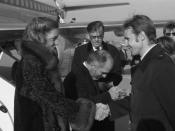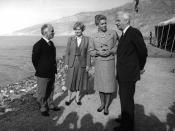"Work for life on this earth as if you are to live forever, and work for the life after in heaven as if you are to die tomorrow" (Queen Noor). A key to influencing many and affecting them in a positive way is working hard. Few people throughout time have changed history, since it is not everyone that has the ability and power to do so. It takes strong people emotionally, physically and mentally to change it. Power is a feature that affects to what extent someone can make a difference. The harder someone works in their life, the more they can achieve. It is even harder for a person to make a difference in a country where he or she was not born and by pursuing their dreams to leave their birth nation behind and move to a completely new one. It is not everyone that can adapt to a culture in a short period of time in order to make a positive change.
A good education is fundamental when it comes to making a difference. Mother Theresa and Grace Kelly are examples of extraordinary women who adapted to a new culture and did wonderful things for people. Lisa Halaby, an American woman with an excellent education, who later became known as Queen Noor Al Hussein of Jordan, was someone that worked hard because she wanted to make a difference in the lives of people. Days after she was married she said, "I wanted to make a difference -- help my husband" (www.cnn.com). She became involved with her husband's country and gave the best of herself. Queen Noor was born on August 1951 and from that day and on she started learning valuable teachings that she would later use in her everyday life. Noor Al Hussein had a great educational background, but it was her self-confidence, humility and compassion that helped her change history.
It was Queen Noor's educational background that made it easier for her to make a difference in history. Najeeb Halaby, Queen Noor's father influenced her deeply. It was the importance he gave to work, the enthusiasm he showed when doing it, and the love towards it that inspired and shaped Queen Noor throughout her whole life. (Queen Noor, pg. 18). After attending various outstanding schools in Los Angeles, Washington, Massachusetts and New York, Noor graduated on 1974 from Princeton University, earning a B.A. in Architectural and Urban Planning. She was part of the first freshman class of women in Princeton University. (www.noor.gov.jo) Queen Noor recently said that her university studies facilitated her life as a queen, "I found that architecture and urban planning was great preparation for public service, because it's mostly about trying to solve problems" (www.cnn.com). She never thought that that career would help her so much in the future. Her preparation opened many doors in the working aspect, which took her to work in Sydney and Iran. As a young woman, Queen Noor of Jordan worked as planning assistant in the building of the model city center in Tehran, Iran. During the time she spent working in Tehran, she learned about the history of Arab countries. (Queen Noor, pg. 36). She was very interested in learning Arabic because this way it would be easier for her to relate with Arabs, so she did. (Queen Noor, pg 180). The influence she received from her father and her educational background assisted Queen Noor in her life.
Although her preparation contributed to her success in many ways, it was her self-confidence that helped her make important decisions that changed her life and other people's lives as well. After knowing King Hussein and falling deeply in love with him, she made the remarkable decision of marrying him. She married him being conscious of all the responsibilities that involved. She knew she would have to become a Jordanian citizen, accept all the duties of the royal palace, and become the mother of Hussein's youngest children. Since Noor knew she was able to cope with all this, she went forward and followed her heart. (Queen Noor, pg. 94). Queen Noor believed profoundly in herself. She thought she could improve women's role in society, children and family health, education and culture. She said, "I developed an office to try to look at the source of problems in our country and really tackle development issues in a serious and sustainable fashion" (www.cnn.com). Her words show self-confidence because even though advisers at the palace told her that her job was only going to involve social activities, she decided to go by her thoughts and build an office to create projects to help people. She also strongly believed that her work would have better consequences if she employed people from different backgrounds. At the beginning of her working career as a public servant she said, "I knew it was important to me to have people working in the office who represented different groups and communities in the country: Muslim and Christian, men and women from the East and West Bank, and from Circassian, liberal, and conservative backgrounds" (Queen Noor, pg 138). Her words show self-confidence because she did what she thought would have better results and it did. So that is why she employed different people. Besides the passionate interest she felt for the Muslim religion, Noor never felt pressured by her husband to become Muslim but she knew it was going to be easier for her to connect with Jordanians. Before becoming Muslim she said, "Honesty, faithfulness and moderation are a few of the virtues that Islam calls for, and by which one Muslim can have merit over another" (Queen Noor, pg. 96). Her words show self-confidence because she did what her heart and conscience told her to do, become Muslim. She was fascinated at the way Muslims lived their lives. Queen Noor's self confidence drove her to constructive events in her life.
Besides her confidence, her humility was what helped her gain Jordanian's love and admiration and this helped Queen Noor modify history. Noor Al Hussein came from a family where humility was distinguished, and this humility was a quality, which she learned a lot from. Humility was something she demonstrated in her every day life. Although she was a queen, her opinion was that instead of people working for her, she had to work for them and she said that once, "At least my husband and I both thought of ourselves as public servants. Not that we were in a position to be served by our people, but that we were to serve them, that that was our duty" (www.cnn.com). Her words show humility because besides being the Queen of Jordan, she preferred being a public servant, and this she demonstrated it in many occasions. In her biography, she recounts one of her visits to a poor community in Jordan as the following, "On a visit to a Bedouin community in Wadi Rum, we received members of the tribe one by one, hearing their requests for help with a sick child or for better schools, housing or transport" (Queen Noor, pg. 98). Her words show her humility because for her it was very important to visit Jordanian communities frequently and resolve every problem that communities had and treated people in the best way possible. Besides showing her humility in her actions and her way of speaking, Queen Noor also showed it in her way of dressing. She never wore extravagant dresses and jewelry because this was disrespectful to common Jordanians, who did not dress profligately. She said, "As much as I admired these magnificent gifts, I never felt completely comfortable wearing them. Jordan was a poor country and it seemed inappropriate to wear such jewelry at home, even if others did on occasions" (Queen Noor, pg. 147). Her words show her humility because even though she had extravagant jewelry, she never wore them and was very careful with the image she showed to the residents of Jordan. Despite the fact that she was a queen, she did not like having excessive privileges and she tried to have a normal life. Queen Noor's humility is an extraordinary characteristic that has promoted huge success in her life.
In addition to her humility, it was her compassion for the wellbeing of the people and the country of Jordan that helped her change history. Queen Noor of Jordan always showed compassion, but not only for her citizens but for the whole world. A way in which she demonstrated her compassion was working for the needed inhabitants of Jordan. She had an office in Al Ma' Wa where she took care of all types of problems that concerned Jordanians. "I hope to contribute to tackling and solving real problems, much as I would have as an urban planner" (Queen Noor, pg. 146). Her words show her compassion because she says how much she desired to help others. Besides the fact that children compose more than half of Jordan's population, Noor had a great affection for them. She chaired Jordan's National Committee for the Child. "I invited government ministers and representatives of international and non-governmental organizations (NGO's) working with Jordanian children to Hashimya Palace, where we met to assess the general state of Jordan's children and to begin to identify short and long term priorities and strategies" (Queen Noor, pg 163). Her words show the great deal of compassion she had for the children because she worked very hard to try to solve the problems that affected them. This committee created immunization campaigns, literature programs to increase the literacy rate and recreational parks for children. (www.noor.gov.jo). Queen Noor had been very worried because of the struggles between Israel and the Arab countries so in 1980 she organized the first Arab Children's Congress. She said, "We convened the first annual Arab Children's Congress, gathering children from throughout the Arab world for two weeks of activities designed to promote understanding, tolerance and solidarity" (Queen Noor, pg. 176). Her words show the compassion she had because her worries drove her to create a congress in order to help the understanding of the Arab and Israeli Conflict among children that were guiltless of this conflict. In 1985 the Noor Al Hussein Foundation was created to strengthen and carry out all the plans and ideas Queen Noor had. Noor said, "The Foundation initiates and supports national, regional, and international projects in the fields of integrated community development, micro finance, women and enterprise development, child and family health, and education and culture" (www.noor.gov.jo). Her words show her compassion because her foundation tries to help every area in Jordan that needs assistance. She creates different programs that are interesting for the people so it can have excellent consequences. The health and happiness of the people and the wellbeing for Jordan are the reasons for Queen Noor's immense compassion.
Despite the huge support that the great educational background gave her, it was Queen Noor of Jordan's self-confidence, humility and compassion that caused her to change history. The knowledge she acquired throughout her young life helped her in what she was going to face in the future. She used the strong self-confidence she possessed to decide what she wanted to give others in life and what she wanted to receive. This she made it by making decisions that would affect her and the people around her as well. Her humility, which showed her kindness, obtained her respect from everyone not only in Jordan but also all over the world. Noor's compassion led to the love of thousands towards her. She said, "I think, probably of trying to work from my heart, true to my conscience and to focus my efforts as much as I'm able to outside of myself" (www.cnn.com). Her words show that her actions were carried out from her heart and always thinking on the good it would do to others. Queen Noor changed history in a positive way because of her glorious actions.
Bibliography:Lunt, James. Hussein of Jordan. London: MacMillan, 1989.
Noor, Queen. Leap Of Faith: Memoirs of an Unexpected Life. New York: Miramax Books, 2003.
"Queen Noor Personal Profile." http://www.noor.gov.jo/personal_profile.htm (13 Mar. 2005)"Queen Noor of Jordan." http://transcripts.cnn.com/TRANSCRIPTS/0504/13/lkl.01.html(14 Apr. 2005)





